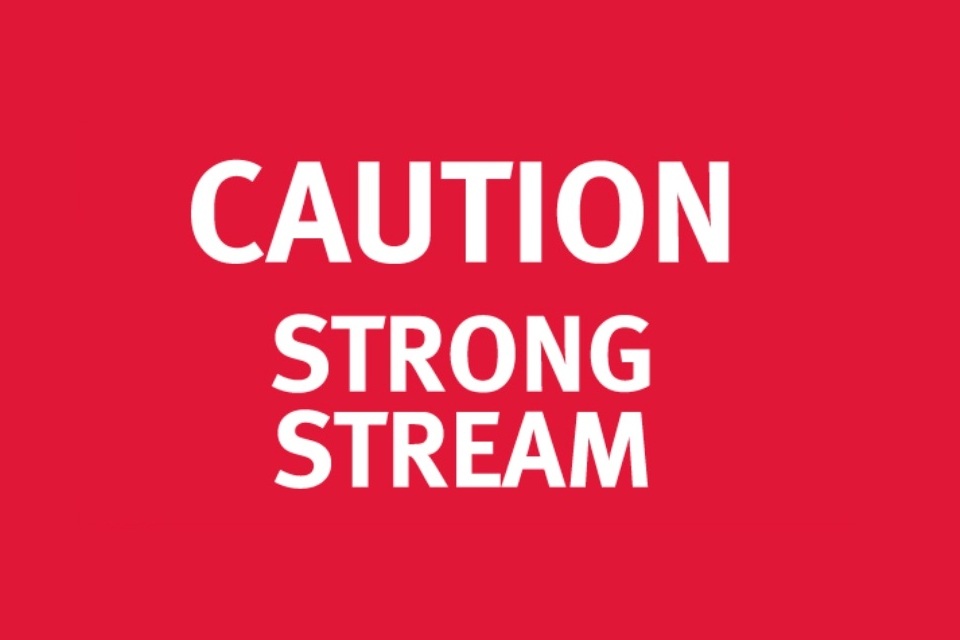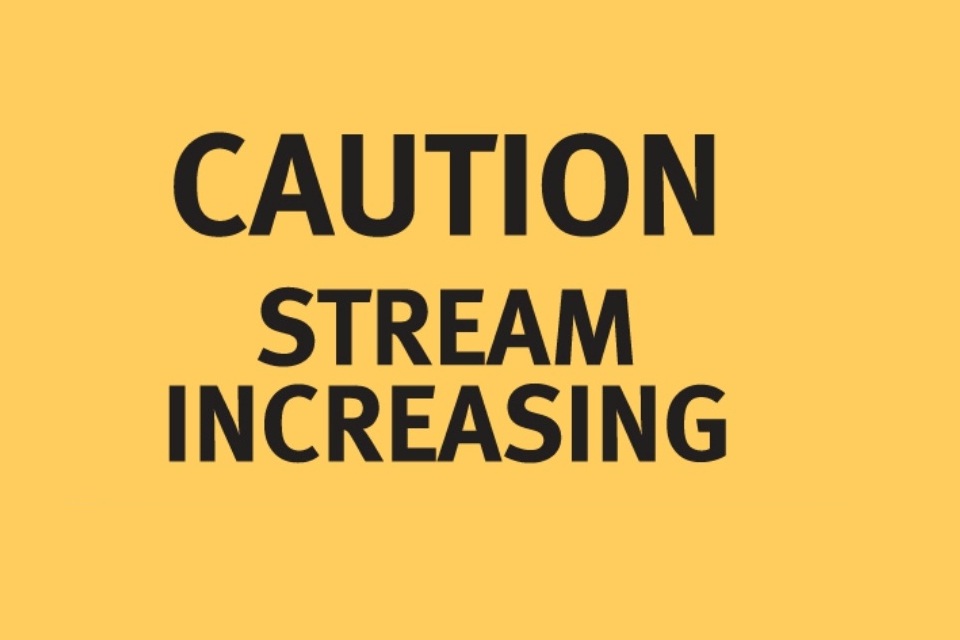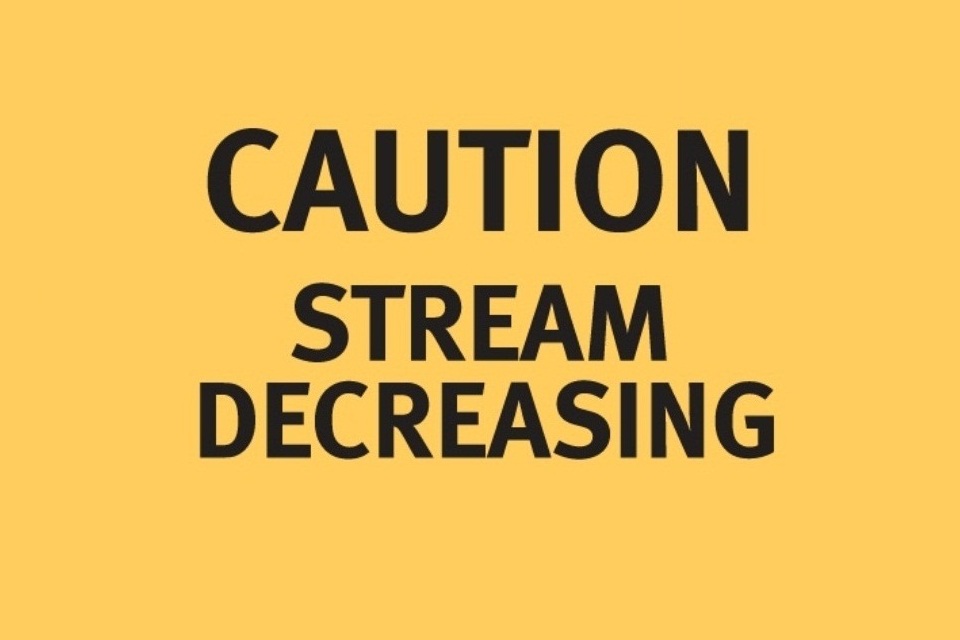River Thames: current river conditions
The current conditions affecting boaters on the River Thames and what the warnings mean.
Before you take your boat out on the River Thames, you should find out the current river conditions and make sure you understand what they mean. You should also check if there are any closures or restrictions in your area.
Find out current river conditionsconditions: updated 12 January 2023
You can also talk to lock staff to get the latest river conditions and strong stream warnings.
Lechlade to Oxford
| Reach | Current conditions |
|---|---|
| Upstream of St John’s Lock | Caution strong stream |
| St John’s Lock to Buscot Lock | Caution strong stream |
| Buscot Lock to Grafton Lock | Caution strong stream |
| Grafton Lock to Radcot Lock | Caution strong stream |
| Radcot Lock to Rushey Lock | Caution strong stream |
| Rushey Lock to Shifford Lock | Caution strong stream |
| Shifford Lock to Northmoor Lock | Caution strong stream |
| Northmoor Lock to Pinkhill Lock | Caution strong stream |
| Pinkhill Lock to Eynsham Lock | Caution strong stream |
| Eynsham Lock to King’s Lock | Caution strong stream |
| King’s Lock to Godstow Lock | Caution strong stream |
| Godstow Lock to Osney Lock | Caution strong stream |
| Osney Lock to Iffley Lock | Caution strong stream |
Oxford to Henley
| Reach | Current conditions |
|---|---|
| Iffley Lock to Sandford Lock | Caution strong stream |
| Sandford Lock to Abingdon Lock | Caution strong stream |
| Abingdon Lock to Culham Lock | Caution strong stream |
| Culham Lock to Clifton Lock | Caution strong stream |
| Clifton Lock to Day’s Lock | Caution strong stream |
| Day’s Lock to Benson Lock | Caution strong stream |
| Benson Lock to Cleeve Lock | Caution strong stream |
| Cleeve Lock to Goring Lock | Caution strong stream |
| Goring Lock to Whitchurch Lock | Caution strong stream |
| Whitchurch Lock to Mapledurham Lock | Caution strong stream |
| Mapledurham Lock to Caversham Lock | Caution strong stream |
| Upstream of Blake’s Lock | Caution strong stream |
| Caversham Lock to Sonning Lock | Caution strong stream |
| Sonning Lock to Shiplake Lock | Caution strong stream |
| Shiplake Lock to Marsh Lock | Caution strong stream |
| Marsh Lock to Hambleden Lock | Caution strong stream |
Henley to Teddington
| Reach | Current conditions |
|---|---|
| Hambleden Lock to Hurley Lock | Caution strong stream |
| Hurley Lock to Temple Lock | Caution strong stream |
| Temple Lock to Marlow Lock | Caution strong stream |
| Marlow Lock to Cookham Lock | Caution strong stream |
| Cookham Lock to Boulters Lock | Caution strong stream |
| Boulters Lock to Bray Lock | Caution strong stream |
| Bray Lock to Boveney Lock | Caution strong stream |
| Boveney Lock to Romney Lock | Caution strong stream |
| Romney Lock to Old Windsor Lock | Caution strong stream |
| Old Windsor Lock to Bell Weir Lock | Caution strong stream |
| Bell Weir Lock to Penton Hook Lock | Caution strong stream |
| Penton Hook Lock to Chertsey Lock | Caution strong stream |
| Chertsey Lock to Shepperton Lock | Caution strong stream |
| Shepperton Lock to Sunbury Lock | Caution strong stream |
| Sunbury Lock to Molesey Lock | Caution strong stream |
| Molesey Lock to Teddington Lock | Caution strong stream |
Call to hear current river conditions
Alternatively, to get the latest river information before you go boating:
- call the Environment Agency Floodline on 0345 988 1188
- select option 1 for river information for boaters
- when prompted, enter one of the quick dial numbers for the area of the river you want to hear about
Floodline quick dial codes
| Quick dial codes | Area | Description |
|---|---|---|
| 415000 | Upstream of St John’s Lock to Radcot Lock | St John’s to Radcot locks, including Buscot and Grafton locks |
| 415001 | Rushey to Godstow Lock | Rushey to Godstow locks, including Shifford, Northmoor, Pinkhill, Eynsham and Kings locks |
| 415002 | Osney to Iffley Lock | Osney to Iffley locks only |
| 415003 | Sandford to Clifton Lock | Sandford to Clifton locks, including Abingdon and Culham locks |
| 415004 | Days to Mapledurham Lock | Days to Mapledurham locks, including Benson, Cleeve, Goring and Whitchurch locks |
| 415005 | Caversham to Shiplake Lock | Caversham to Shiplake locks, including Sonning Lock |
| 415006 | Marsh to Boveney Lock | Marsh to Boveney locks, including Hambleden, Hurley, Temple, Marlow, Cookham, Boulters and Bray locks |
| 415007 | Romney to Bell Weir Lock | Romney to Bell Weir locks, including Old Windsor Lock |
| 415008 | Penton Hook to Chertsey Lock | Penton Hook to Chertsey locks only |
| 415009 | Shepperton to Teddington Lock | Shepperton to Teddington locks, including Sunbury and Molesey locks |
| 415010 | River Kennet upstream of Blakes Lock | River Kennet for upstream of Blakes Lock and down to the confluence with the River Thames |
What the warnings mean
Any river activity poses a greater risk when there are strong currents, high river levels or cold weather conditions. River flows can increase even during the summer months. Never assume that sunny weather means the conditions are not hazardous.
The Environment Agency may display warning boards at locks to inform river users of the conditions. Read the explanations of what these mean for you. Do not take risks and never underestimate the power of the river.
Strong stream warning

Strong stream warning board
When these red boards are displayed on lock gates, the Environment Agency advises users of all boats not to navigate. The strong flows make it difficult and dangerous.
People in hire boats arriving at a lock where these boards are displayed should stop immediately. Contact your hire boat operator to ask for instructions.
Stream increasing warning

Stream increasing warning board
When these yellow boards are displayed on lock gates, the Environment Agency advises:
- users of all unpowered boats not to navigate
- users of powered boats to find a safe mooring
River flows are likely to strengthen, and strong stream boards could be displayed very soon and without further warning.
Stream decreasing warning

Stream decreasing warning board
When these yellow boards are displayed on lock gates, the Environment Agency advises:
- users of all unpowered boats not to navigate
- users of powered boats to navigate with caution
Using navigation marks
When travelling upstream, keep red navigation buoys to your left and green navigation buoys to your right.
When travelling downstream, keep red buoys to your right and green buoys to your left.
You may pass single yellow marker buoys on either side.
In all cases, keep well clear of navigation buoys. Be aware of possible shoals on the inside of river bends.
Dealing with changing river conditions
If you find yourself in conditions where the Environment Agency advises you to stop navigating, please take the advice and stop. Even the most experienced boater can be caught out, so think about those who could be put in danger if they have to help you.
You may find the following measures helpful. Not all conditions will be serious enough to need all the suggested measures.
Moor your boat in a safe place, preferably in a marina or at a recognised mooring. Limited space may be available at some locks. Moor against high banks if you can.
Ensure your mooring lines are fastened to secure fixings such as bollards, rings or even trees. Put out extra lines for more security and allow enough slack for a further rise in river levels. Do not rely on your own mooring pins or stakes, as they might not hold.
If possible, put extra fendering (such as scaffold poles or strong timber posts) between your boat and the bank side. This may prevent your boat drifting onto the river bank and becoming caught up when levels drop.
Make sure you have a safe exit ashore from your boat. If not, consider returning home or finding alternative accommodation until conditions improve.
If you are not able to vacate your boat safely and are running low on essential supplies or have other safety concerns, treat this as an emergency. Dial 999 to ask for evacuation.
Those in hire boats should stop immediately if you are advised to stop navigating. Contact your hire boat operator and follow their instructions.
Please remember your life is more important than your boat.
The Environment Agency does not provide emergency services. We are not able to carry out search and rescue, or provide supplies to stranded boats.
Contact the Environment Agency
General enquiries
National Customer Contact Centre
PO Box 544
Rotherham
S60 1BY
Email enquiries@environment-agency.gov.uk
Telephone 03708 506 506
Telephone from outside the UK (Monday to Friday, 8am to 6pm GMT) +44 (0) 114 282 5312
Monday to Friday, 8am to 6pm.
The impact of COVID-19 means you may experience some delays in responses.
Environment incident hotline
Telephone (24 hour service) 0800 80 70 60
Floodline
Telephone (24 hour service) 0345 988 1188
Type talk (for the hard of hearing) 0345 602 6340
Last updated
-
River Thames current river conditions updated for Thursday 12 January 2023.
-
Added a section on using navigation marks.
-
Added contact details for the Environment Agency.
-
First published.